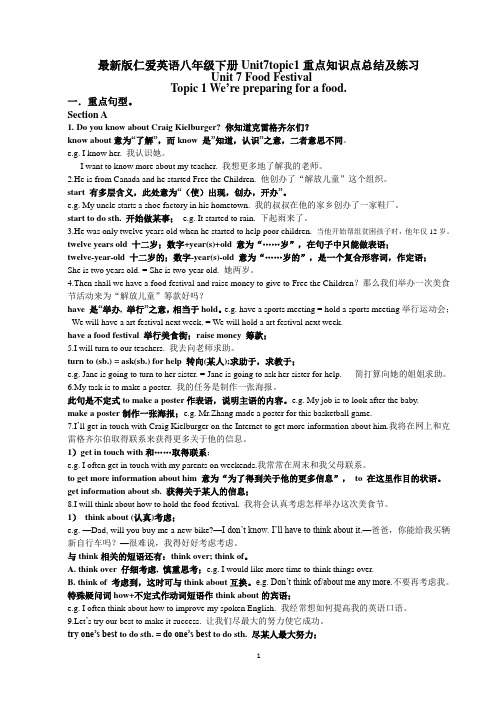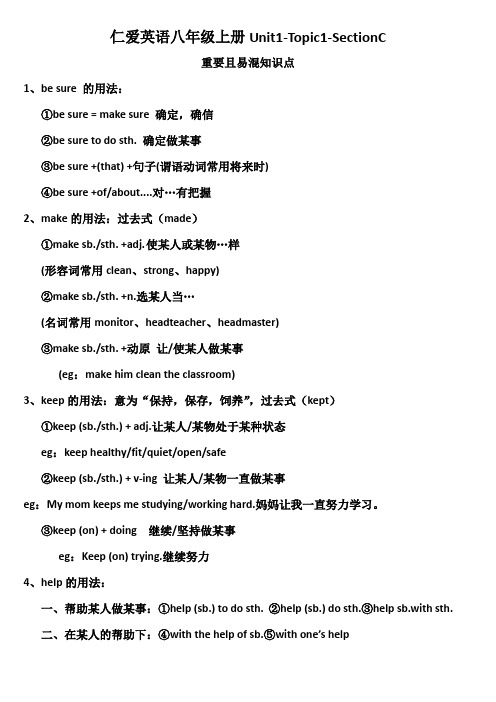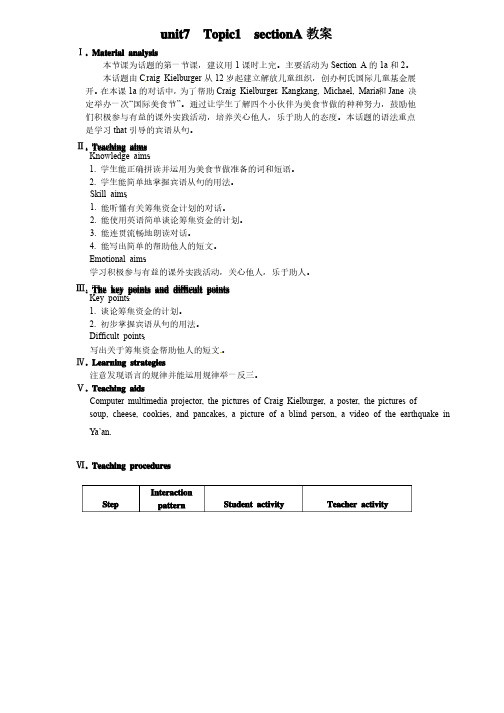八年级仁爱英语unit7 topic1 section C课件
最新版仁爱英语八年级下册Unit7topic1重点知识点总结及练习--最新版

最新版仁爱英语八年级下册Unit7topic1重点知识点总结及练习Unit 7 Food FestivalTopic 1 We’re preparing for a food.一.重点句型。
Section A1.Do you know about Craig Kielburger? 你知道克雷格齐尔们?know about意为“了解”,而know 是”知道,认识”之意,二者意思不同。
e.g. I know her. 我认识她。
I want to know more about my teacher. 我想更多地了解我的老师。
2.He is from Canada and he started Free the Children. 他创办了“解放儿童”这个组织。
start 有多层含义,此处意为“(使)出现,创办,开办”。
e.g. My uncle starts a shoe factory in his hometown. 我的叔叔在他的家乡创办了一家鞋厂。
start to do sth. 开始做某事;e.g. It started to rain. 下起雨来了。
3.He was only twelve years old when he started to help poor children. 当他开始帮组贫困孩子时,他年仅12岁。
twelve years old 十二岁;数字+year(s)+old 意为“……岁”,在句子中只能做表语;twelve-year-old 十二岁的;数字-year(s)-old 意为“……岁的”,是一个复合形容词,作定语;She is two years old. = She is two-year old. 她两岁。
4.Then shall we have a food festival and raise money to give to Free the Children?那么我们举办一次美食节活动来为“解放儿童”筹款好吗?have 是“举办, 举行”之意,相当于hold。
八年级仁爱英语上册UNIT1复习课件

swim 购物______ shop 游泳_______
go+ ving
去滑冰------- go skating 去滑雪------- go skiing 去划船------- go rowing 去骑自行车------ go cycling 去爬山----------- go climbing 去钓鱼-------- go fishing 去划船-------- go boating 去游泳-------- go swimming 去购物-------- go shopping
2.quite a bit =quite a lot 许多,经常
seldom 很少 3.join---团体、组织、俱乐部 join sb. take part in+活动 take part in We will_________________ the long jump, Would you like to___________ us? join
4.see sb. do sth. 看见某人做某事经常做某事或做某事的 全过程 see sb. doing sth.看见某人正在做某事
eg. I often see him run on the playground.
I saw him running on the playground at this
11.leave离开
leave for…动身去…
leave…for…离开…去…
left for yesterday. 他昨天去北京了。 He ________
定义:一般将来时表示将来某一时刻的动作或状态. 标志词:Tomorrow ,the day after tomorrow, soon, later, next week (month, year…),in 3 days 等 构成: be(am,is,are) going to + v原 Will + v原
仁爱英语八年级上册Unit1-Topic1-SectionC重要且易混知识点

仁爱英语八年级上册Unit1-Topic1-SectionC重要且易混知识点1、be sure 的用法:①be sure = make sure 确定,确信②be sure to do sth. 确定做某事③be sure +(that) +句子(谓语动词常用将来时)④be sure +of/about....对…有把握2、make的用法:过去式(made)①make sb./sth. +adj. 使某人或某物…样(形容词常用clean、strong、happy)②make sb./sth. +n.选某人当…(名词常用monitor、headteacher、headmaster)③make sb./sth. +动原让/使某人做某事(eg:make him clean the classroom)3、keep的用法:意为“保持,保存,饲养”,过去式(kept)①keep (sb./sth.) + adj.让某人/某物处于某种状态eg:keep healthy/fit/quiet/open/safe②keep (sb./sth.) + v-ing 让某人/某物一直做某事eg:My mom keeps me studying/working hard.妈妈让我一直努力学习。
③keep (on) + doing 继续/坚持做某事eg:Keep (on) trying.继续努力4、help的用法:一、帮助某人做某事:①help (sb.) to do sth. ②help (sb.) do sth.③help sb.with sth.二、在某人的帮助下:④with the help of sb.⑤with one’s help。
新仁爱版八年级英语下册unit7Topic1sectionA教案

unit7 Topic1 sectionA 教案Ⅰ. Material analysis本节课为话题的第一节课,建议用1课时上完。
主要活动为Section A 的1a 和2。
本话题由C raig Kielburger 从12岁起建立解放儿童组织,创办柯氏国际儿童基金展开。
在本课1a 的对话中,为了帮助Craig Kielburger ,Kangkang, Michael, Maria 和Jane 决定举办一次“国际美食节”。
通过让学生了解四个小伙伴为美食节做的种种努力,鼓励他们积极参与有益的课外实践活动,培养关心他人,乐于助人的态度。
本话题的语法重点是学习that 引导的宾语从句。
Ⅱ. Teaching aims Knowledge aims :1. 学生能正确拼读并运用为美食节做准备的词和短语。
2. 学生能简单地掌握宾语从句的用法。
Skill aims :1. 能听懂有关筹集资金计划的对话。
2. 能使用英语简单谈论筹集资金的计划。
3. 能连贯流畅地朗读对话。
4. 能写出简单的帮助他人的短文。
Emotional aims :学习积极参与有益的课外实践活动,关心他人,乐于助人。
Ⅲ. The key points and difficult points Key points :1. 谈论筹集资金的计划。
2. 初步掌握宾语从句的用法。
Difficult points :写出关于筹集资金帮助他人的短文。
Ⅳ. Learning strategies注意发现语言的规律并能运用规律举一反三。
Ⅴ. Teaching aidsComputer Computer multimedia multimedia multimedia projector, projector, projector, the the the pictures pictures pictures of of of Craig Craig Craig Kielburger, Kielburger, Kielburger, a a a poster, poster, poster, the the the pictures pictures pictures of of soup, cheese, cookies, and pancakes, a picture of a blind person, a video of the earthquake in Ya’an.Ⅵ. Teaching proceduresStep Interaction patternStudent activity Teacher activityIntroduction (8 minutes)1. The whole class work. 2. The whole class work. 3. Group work. 4. The whole class work. 5. The whole class work. 1. Focus their attention on the teacher. 2. Students read the passage passage about about about the the the traffic traffic rules rules they they they made made made after after class. 3. Students discuss in groups and ans w er the wer the questions with the structure: I think Iwill…4. Students learn and grasp the new words and phrases with the help of the teacher. 5. Students report the information about Craig Kielburger they collected. 1. Greet students ready for learning. 2. Teacher asks the students to to report report report the the the homework. homework. Let Let the the the students students students read read read the the passage passage about about about the the the traffic traffic rules they made after class. 3. Teacher asks the students to think about the following questions: If someone isin trouble, what will youdo? If someone needs money,what will you do? Then ask the studen ts to answer them with the structure: I think I will…4. 4. Teacher Teacher Teacher teaches teaches teaches the the the new new words by summing up the answers above: “Now Now I I I see, see, see, some some some students students will turn to their their parents, parents, which means they will ask their parents for help. Some students imaginethat they can put on a play to to raise raise raise money. money. money. Y ou Y ou can can try your best to help others, others, I’m I’m I’m so so so proud proud proud of of you!”5. 5. Teacher Teacher Teacher shows shows shows the the the pictures pictures o f Craig Kielburger to the students. Ask the students to to report report report the the the information information about Craig Kielburger they collected. Presentation (10 minutes) 1. The whole class work. 2. Individual work. 3. The whole class work. 4. Individual work. 5. The whole class work. 6. The whole class work. 7. Individual work. 8. The whole class work. 9. Individual work. 10. The whole class work. 1. Students look at the picture of 1a, and understand understand the the the picture picture with the help of the information under it. 2. Students watch the flash, and then mark the sentences of 1b wi th T or F. 3. Students check the answers. 4. Students read the conversation and match the information of 1c. 5. Students check the answers. 6. Students read the sentences aloud. 7. Students find out the same same structure structure structure in in in the the sentences of 1c. 8. Students check the answers. 9. Students watch the flash flash and and and answer answer the questions. 10. Students check the answers. 1. T eacher praises students’ information they collected after after class. class. class. Encourage Encourage Encourage them them to keep on making a preview before before class. class. class. Then Then Then let let let the the students students look look look at at at the the the picture picture of of 1a 1a 1a and and and undund erstand erstand the the picture picture with with with the the the help help help of of of the the information under it. 2. Teacher plays the flash of 1a. Ask the students to watch watch the the the flash, flash, flash, and and and then then mark mark the the the sentences sentences sentences of of of 1b 1b with T or F. 3. Teacher asks two students to tell the answers. 4. Teacher asks the students to to read read read the the the conversation conversation and match the information of 1c. 5. Teacher asks two students to tell the answers.6. Teacher asks the students to read the sentences aloud. 7. Teacher asks the students to find out the same structure in the sentences of 1c. 8. Teacher asks two students to tell the answers. 9. Teacher asks the students to watch the flash again and answer the following questions: (1) How many schools did Free the Children build? (2) What’s Michael’s task?10. Teacher asks two students to tell the answers. Teach the new word p osterposter by showing a real poster to them. Consolidation (10 minutes) 1. The whole class work. 2. The whole class work. 3. Group work. 4. The whole class work. 5. Group work. 6. The whole class work. 7. The whole class work. 1. Students read the conversation after the recording sentence by sentence. 2. Students try to follow the speed, paying attention to the pronunciation and intonation. 3. Students discuss in groups groups to to to find find find out out out the the difficult difficult points points points and and and sum sum up the main points. 4. 4. Students Students Students underline underline underline in in their books and make some notes. Learn and grasp grasp the the the new new new words words and phrases. 5. Students discuss in groups: What will the food festival be like? 6. V olunteers report the result of the discussion. 7. Students act out the conversation of 1a. 1. Teacher plays the recording sentence by sentence. 2. Teacher plays the recording without stopping. 3. Teacher asks the students to learn in groups to find out the difficult points in the conversation. At last let them sum up the main points of the conversation. 4. 4. T eacher T eacher makes makes makes a a a summary summary to to explain the key points and explain the key points and difficult points to the students. (1) have/hold/ organize a food festival (2) turn to sb. /ask sb. for help (3) make a poster (4) get in touch with sb. (5) try one’s best to do sth. (6) make it a success (7) 由that 引导的宾语从句引导的宾语从句5. T eacher lets the students read 1a, and then discuss what the food festival will be like with the the help help help of of of the the the pictures pictures pictures and and the example. Let them practice the usage of the object clauses. 6. Teacher asks four students to report the result of the discussion. Finish 1d. 7. T eacher asks the students to act out the conversation of 1a. Practice (10 minutes) 1. The whole class work. 2. Group work. 3. Individual work. 4. The whole class work. 5. Pair work. 6. Individual work. 7. The whole class work. 1. Students learn and grasp the new words with the help of the teacher. 2. Students discuss what the children children should should should prepare prepare for for the the the food food food festival festival festival in in groups. 3. Students write down the conversations. 4. Students evaluate the conversations, conversations, and and and then then check check the the the answers answers answers with with the teacher. 5. Students act out the conversations in pairs. 6. Students listen and match match the the the people people people with with what we can do. 7. Students check the answers. 1. Teacher teaches the new words soup, cheese, cookies,and pancakes by by showing showing their pictures on the screen. Teach set and set the tableby explaining their Chinese meaning. 2. Teacher asks the students to discuss what the children should prepare for the food festival. 3. Teacher asks four students to write down the conversations on the blackboard. The other students write down at least two conversations in their each workbook. 4. 4. Teacher Teacher Teacher lets lets lets two two two or or or three three students evaluate the conversations on the blackboard. Check the answers. 5. Teacher lets the students act act out out out the the the conversations conversations in pairs. 6. 6. Teacher plays the recording Teacher plays the recording of of 3 3 3 for for for the the the students students students and and lets the students listen and match the people with what we can do. 7. 7. Teacher Teacher Teacher lets lets lets two two two students students tell tell their their their answers. answers. answers. Teach Teach blind by showing a picture of a blind person. Production (7 minutes) 1. Group work. 2. The whole class work. 3. The whole class work. 4. The whole class work. 5. Individual work. 1. Students watch the video and discuss in groups. 2. Students write down their opinions with the structure I think…3. Students share their opinions with with the the whole class. 4. Students summarize Section A with the teacher. 5. Students finish the homework after class. 1. Teacher plays the video of the Ya’an earthquake. Lead the students to discuss in groups: “A terr“A terrible earthquake ible earthquake struck Ya’an in Sichuan Province at 8: 02 on the morning of April 20th this year. Le t’s discuss how to help the p eople in Ya’an.”people in Ya’an.”2. Teacher asks the students to write down their opinions with the structure Ithink…3. Teacher asks four students from different groups to share their opinions. Tell them that we should try our best to help the people in trouble. 4. Teacher shows the summary of this section to the students. 5. Teacher assigns homework: (1) Review the summary after class. (2) Write down a passage about how to help the the people people people in in in Y Y a’an with the sentences containing object clauses. (3) Search some typical foods in different countries to prepare for Section B. Teaching Reflection The students a dmire Craig Kielburger very much. It’s a successful admire Craig Kielburger very much. It’s a successful lesson: lesson: The The The students students students want want want to to to learn learn learn from from from him him him to to to help help help the the the people people people in in trouble. The teacher should introduce more information of Craig Kielburger to the students to encourage them to help others from now on. Ⅶ. Blackboard designUnit 7 Food Festival Topic 1 We’re preparing for a food festival. Section A 1. have/hold/ organize a food festival 2. turn to sb. /ask sb. for help 3. make a poster 4. get in touch with sb. 5. try one’s best to do sth.6. make it a success 7. Kangkang knows (that) Graig comes from Canada. 8. set the table 。
21_caojianzhong八年级仁爱英语上UnioicSecionA课件

J:Thankyou.We’ll….
快点 开始做 和…谈话 一直
拥挤的地方
接纳某人的建议 远离… 最好不要做某予 事立刻 服药 使…身体铸强健 运动苍过量
hurryup goahead
talkwith/tosb. allthetime
crowdedplaces follow/takeone’sadvice keep/stayawayfrom had叨b时et婶te匹rnotdosth ato贝n序ce宁 tak做es证o硬me眠卧med补ic训ine
目前流随感鼻在人壮们之旺中迅滤速蔓征延。
Wha局ts改永hou湖ld昏w谜ed扔o截t棚op脖r夕e搜ven彻ti莲t伙?
/ No, we needn’t.
do exercise see a doctor.
change our clothes often.
3Leabharlann Work alone(录音1)
A. Listen and circle the symptoms of the flu that you hear.
fever headache
go to crowded places.
keep the windows open.
exercise often to change our go to crowded build up our bodies. clothes often. places.
Must we …? Yes ,we must.
□ 3.g讽o独t误ob泰威ede牲a糖rl马y
□√ 4.w袜盐ash剃刑ha再 nds提耽and毁软ch庭an歉gec躬l境ot车h熊eso雁f尸t讨 en √□ 5.k赚抄eep岁序our茫r翼o邪oms抛c度l忽ea巡寿n
Unit7SectionAGrammarFocus-3c课件人教版英语八年级上册

We can use less water and plant more trees. Everyone should play a part in saving the earth.
2d Role-play the conversation
Nick: What are you reading, Jill?
_l_e_s_s_beer.
3a Fill in the blanks with more, less or fewer.
1. In the future, there will be l_e_s_s____ fresh water because there will bemore _____ pollution in the sea.
be fewer trees and the environment will be in greats bad! Will we have to move to other planets? Jill: Maybe. But I want to live on the earth. Nick: Me, too. Then what can we do? Jill: We can use less water and plant more trees. Everyone should play a part in saving the earth.
3. People now usually live to be about 70-80 years old, but in the future_____________ _p__eo__p_le__w_i_ll_l_iv_e__to__b_e_2_0_0__y_e_a_r_s_o_ld__. _____
仁爱英语八年级上册Unit1 知识汇总课件

4. I hope our team will win.我希望我们队获胜。
(1)hope常用于以下两种结构。
hope to do sth.希望做某事 hope + that 从句 (2)win 赢得 过去式为won ,名词形式是winner
5.Would you like to come and cheer us on?你愿意来为我们加油吗?
be sorry for 为……感到抱歉、难过
6.You are sure to have more fun.你们一定会玩得更开心。 be sure to do sth.确信做某事。 如果sure 后面的主语和前面的主语是同样的,就用be sure to do sth.;如 果不是同一个主语就用be sure that…
4. Basketball is both an indoor and outdoor game.篮球是户内运动,也是户外运 动。 both …and 意为“两者都……”,这个短语作主语时,谓语动词要用复数形式。 5. The goal is to throw the ball through the other side’s basket, and to stop the other team from doing so.(比赛)目标是将球投入对方的篮筐而得分,并 阻止对方这样做。 (1)through 介词,意为“通过,穿过”,指从物体的中间通过,穿过。 (2)stop … from doing sth.意为“阻止……做某事” 6. You can throw it from any part of the court…你可以从球场的任何地方把球 投进球篮…… any 后接可数名词单数形式或不可数名词,意为“任何,任一” 7. But it is more important for you and the other players to play as a team.但对 于你和其他队员来说,团队合作是很重要的。 It is + 形容词+(for sb.)+to do sth.意为“(对于某人而言)做……是……样 的”。这是一个由it 做形式主语的句型,真正的主语是后面的动词不定式。 It is + 形容词+(of sb.)+to do sth.意为“(对于某人而言)做……(品质) 8. A large number of people enjoyed basketball.许多人喜欢篮球。 a large number of 意为“大量的,许多的”,相当于lots of , many ,只修饰可数 名词。
仁爱英语八年级下册 Unit7 Topic1 Section A 课件

与某人在网上联系 获得更多有关…... 的信息 考虑
Key Sentences
1) I know he wants to build a new school for his poor village in Nigeria.
2) I think money must be a problem for him.
Kangkang: Good! I’ll get in touch with Daniel on the Internet to get more information about him.
Jane:
Maria:
I will think about how to organize the food festival.
Jane:
Do you know about Daniel Igali?
Kangkang: Yes. He is the first Canadian Olympic wrestling champion. Michael : But he was born in Nigeria. Maria: Jane: Yes. And I know he wants to build a new school for his poor village in Nigeria. He is very kind. But I think money must be a problem for him.
1b
Work alone
Read 1a again and match.
Jane says (that) Kangkang knows (that) Michael thinks (that) Maria says (that)
- 1、下载文档前请自行甄别文档内容的完整性,平台不提供额外的编辑、内容补充、找答案等附加服务。
- 2、"仅部分预览"的文档,不可在线预览部分如存在完整性等问题,可反馈申请退款(可完整预览的文档不适用该条件!)。
- 3、如文档侵犯您的权益,请联系客服反馈,我们会尽快为您处理(人工客服工作时间:9:00-18:30)。
电话用语
1. Hello. May I speak to ... ? 2. Who’s this/that? ’ 3. This is ... speaking. 4. Is that ... speaking? 5. He/She isn’t here right now. isn’ 6. Can I leave/take a message? 7. Hold the line/Hold on, please. 8. Sorry, I can’t hear you. ’
ቤተ መጻሕፍቲ ባይዱ 2b
Work alone
Complete the table according to 2a. Name Daniel Igali Country Canada wrestling Favorite sport fried chicken Favorite food Year (won a gold 2000 medal) Reason to build very old and small village school, a school only a few school supplies
(Uncle Yang is an English teacher in a high school. Kangkang is inviting him to the food festival over the phone.) Operator: Hello! No.37 High School. Kangkang: Hello! Extension 6006,please. Hold on, please. Operator: OK. __________________ Uncle Yang: (A few seconds later) Hello! this is Kangkang. Kangkang: Hello! Uncle Yang,_______________ What’s up Uncle Yang: ______________, Kangkang? Kangkang: We’re going to have an international food festival to raise money for a village school in Nigeria. May I invite you to come? Uncle Yang: What a surprise! I’d love to. _______________________When and where? Kangkang: On our school playground on May 16th. It’s Sunday. You must come to our food festival. Uncle Yang: OK. I’m pleased to hear that. ____________________Keep up the good work, Kangkang!
try to do sth. be pleased to do sth. keep up the good work in order to work hard at school Hold on/wait a moment/just a minute/hold the line what a surprise/how surprising! 多么令人吃惊! 多么令人吃惊! for sale 待售 仅仅几个学校活动器 only a few school supplies what’s worse 材 be pleased with 更糟糕的是 get wet 对…满意 满意 淋湿 试图做某事 乐意做某事 继续努力 为了 在学校里努力学习 稍等
Dear Kangkang, inviting Thank you for _______(invite) me to your food festival. I’m to go sorry I’m not able______ (go). myself tell Let me _____ (tell) you something about ______(I), Nigerian children and my village school. I was born in Nigeria came and I’m a wrestler. I _____(come) to Canada in 1994. My favorite food is fried chicken. Wrestling, of course, is my won favorite sport. I ____ (win) a gold medal in the 2000 Sydney lovely Olympics. Nigerian children are as _____(love) as the children everywhere else. They work hard at school. They playing also enjoy _______(play) games. However, the school in my supplies village is very old and small. It has only a few school _______ rains (supply). What’s worse, when it_____ (rain), the children in the classrooms all get wet. So I want to build a new school pleased doing for them. I’m very _______(please) with what you are_____ ______(wish) to your friends. (do) for us. Please give my best wishes Sincerely, Daniel
1.When it rains, the children outside the classroom all get wet _____ ____ ______(全身淋湿 全身淋湿). 全身淋湿 have/hold a __________(举办美食节 2.They are going to ____ ___ ____food festival 举办美食节 举办美食节) next month. keep up ___ ____ _____(继续努力 3.You make progress. ____ ___the good work 继续努力 继续努力). 4.这里有很多种美味的食物正在出售。 这里有很多种美味的食物正在出售。 这里有很多种美味的食物正在出售 for sale There are many kinds of delicious foods _____ _____ here. 5.—May I speak to Maria? Hold on 请等一下), —_____ _____(请等一下 ,please. 请等一下 6.她早早到场为了找个好位置。 她早早到场为了找个好位置。 她早早到场为了找个好位置 in She arrived early _____ order _____ get a good seat. _____ to 7.一定要来参加我的生日晚会哦! 一定要来参加我的生日晚会哦! 一定要来参加我的生日晚会哦 You must ____ ____ my birthday party! ____ come to
1b Work alone Here is an invitation to Uncle Yang from Kangkang. Please help him complete it. The information in 1a may help you.
invite I would like to _____ you to the international food festival at Ren’ai International School at _____ Sunday 11:00 a.m., on _______,May 16th.We students will cook many delicious international foods raise for sale in order to _____ money for a village school in Nigeria. Hope to see you then!
总结keep用法 总结keep用法 keep 保持某种状态 是某人/ 是某人/物处于某种状态 继续做某事 让某人一直做某事 继续工作
keep+adj. keep sb/sth+adj. keep doing sth keep sb doing sth keep up the good work
In order (not) to do 为了(不 做某事 为了 不)做某事 In order that+从句 从句=so that +从句 以便于” 从句 从句 “以便于” In order ___________(not miss) the early bus, I have to not to miss get up early. in order that He works hard______________ he can pass the exam.
1a
Look, listen and say
1. Who else does Kangkang want to invite? Uncle Wang 2. When and where are they going to have the food festival? On their school playground on May 16th.
Unit 7 Food Festival Topic1 May I invite you to our food festival? Section C
